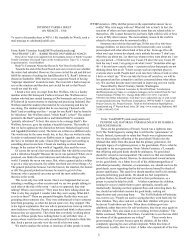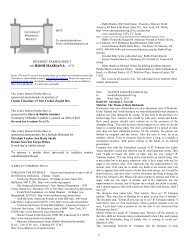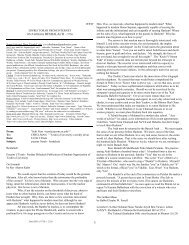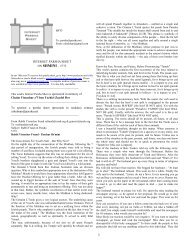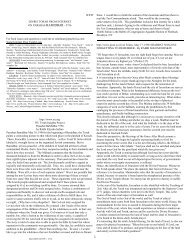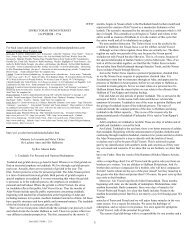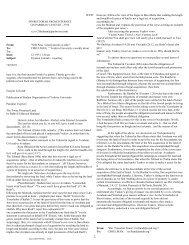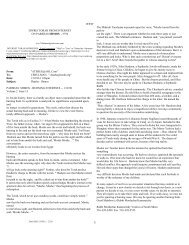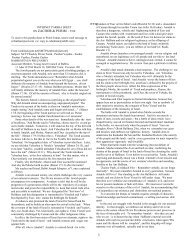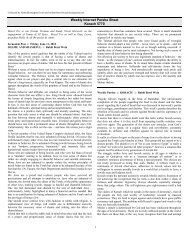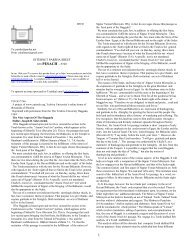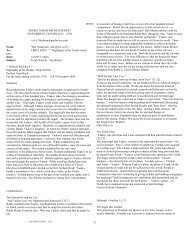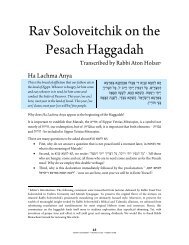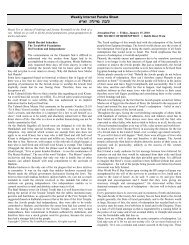Create successful ePaper yourself
Turn your PDF publications into a flip-book with our unique Google optimized e-Paper software.
To: <strong>Parsha</strong>@YahooGroups.comFrom: crshulman@aol.comINTERNET PARSHA SHEET<strong>ON</strong> <strong>TOLDOS</strong> - <strong>5763</strong>BS"DTo receive this parsha sheet in Word and/or Text format, send a blanke-mail to parsha-subscribe@yahoogroups.com or go tohttp://groups.yahoo.com/group/parsha/join Please also copy me atcrshulman@aol.com For archives of old parsha sheets seehttp://groups.yahoo.com/group/parsha/messages For Torah links seehttp://groups.yahoo.com/group/parsha/ links________________________________________________From: RABBI YISSOCHER FRAND [ryfrand@torah.org]Subject: Rabbi Frand on <strong>Parsha</strong>s ToldosDon't Read Too Much Into A Red ComplexionEisav came in from the field, tired, and said to Yaakov in a verybrusque manner, "Pour into me now some of that very red stuff...therefore he was called Edom [the red one]" [Bereshis 25:30].I saw an observation from Rav Shaul Katzenellenbogen, of blessedmemory. If Eisav was really going to be called 'the red one', that nameshould have really been established years earlier. Even at birth we aretold that "the first one came out, reddish (admoni)" [25:25]. This wouldhave been a more significant occasion on which to call him 'Red'. Thefact that at age 15 he asked his brother for red soup would seem to bean almost trivial reason to give him such a name -- yet the Torahspecifically links the name to the latter incident. Why?Rav Katzenellenbogen suggested the following answer. Obviously, theterminology 'the red one' is a pejorative. It is not a flattering title. WhenEisav was born with a red complexion, no one wanted to jump toconclusions about his nature based on his skin color. No one wanted tosuggest that he might have a proclivity to shed blood or to be a 'wild'person. It is inappropriate to assign such labels to a person at birth.Why should he be stamped as "the bloody one," just because of hisred complexion? Who knows what might become of him?It is indeed ironic that the Tanach teaches about another person inJewish history who had a reddish complexion. The pasuk says "and hewas ruddy (admoni), with fair eyes and a pleasing appearance"[Samuel I 16:12] regarding Dovid, the future King of Israel. In fact, theMedrash tells us that Shmuel, upon initially seeing Dovid, was put offby his complexion and feared that he would turn out to be a violentperson like Eisav.The Medrash says that G-d reassured Shmuel by saying that althoughDovid -- like Eisav -- had a proclivity to kill, unlike Eisav, he would onlykill with the authorization of the Sanhedrin. Eisav killed on a whim.Dovid only killed when he was supposed to kill - to save lives. He hadthat inborn ability to kill, but he channeled it into the most noble offunctions.When Eisav was first born, he was not given the pejorative label 'thered one', because we never know what a person will do with hisaffinities. Fifteen years later, he came in from the field tired and hungry.Our Sages teach that he had committed five cardinal sins on that day.When under such circumstances Eisav said, "give me the 'red'", itbecame apparent that he deserved the name 'Edom'. He clearly hadnot channeled his proclivities properly. It was then appropriate to callhim 'the red one'.The Vilna Gaon cites a Talmudic passage on the famous pasuk"Educate each child according to his ability..." [Mishlei 22:6]: "He who isborn under the influence of Mars (the red planet) will be a shedder ofblood. Rav Ashi observed: "Either a surgeon, a thief, a shochet [onewho slaughters animals], or a mohel [one who circumcises]" [Shabbas156a]. It all depends what one does with his natural inclination. Aperson is born with traits and abilities. But a person can take even themost ignoble of traits -- spilling blood -- and turn it into the most nobleof professions. That was the difference between the 'admoni'[reddishness] of Dovid and the 'admoni' of Eisav. Here were two peoplewith the same types of inclinations. One became a Dovid HaMelechand the other became the wicked Eisav. Only now at age 15 couldpeople really see what the kid had become, and they could truly attachthe label "Edom" [the red one].Yitzchak Got 'Nachas' Even From The Rebels and TraitorsThe Medrash makes a play on words using the verse "And he smelledthe aroma of his clothing (begadav) and he blessed him" [Bereshis27:27]. The Medrash substitutes the word 'Bogdav' [his traitors] for theword 'begadav' [his clothing]. At some level, Yitzchak not only hadpleasure from the aroma of the clothes of Yaakov, but he even hadpleasure from the knowledge of the character of the traitors who woulddescend from him.The Medrash cites the story of Yosef Meshisa. The Romans who weredestroying the Beis HaMikdash feared to enter the Holy Templethemselves and preferred to have a Jew be the first one to enter anddefile it. To entice the Jews to cooperate, they offered that whoeverwould go in and defile the Temple could keep one item of his choosingfor himself. Yosef Meshisa volunteered and removed the goldenMenorah as his reward.The Romans told him that this item was too luxurious for a simpleperson such as himself to keep. They told him to go back in and makea second more appropriate selection. At that point, Yosef Meshisa wastaken aback. "Look how far I have fallen as a Jew! I need the Romansto remind me that it is inappropriate for me to take the Menorah formyself?" He subsequently refused to go in again. "It is bad enough thatI angered my G-d going in once. I will not go in a second time." TheRomans tortured him to death, but he refused to go back in.This is the meaning of the Medrash. Yitzchak even had pleasure(nachas) from the rebels of the Jewish people -- who ultimately camearound to Teshuva, return to G-d. The Yosef Meshisas of the world,who at one point in their lives had no shame and did everything againsttheir G-d, but eventually turned their lives around and returned to G-d,brought much satisfaction to Yitzchak.I once heard a beautiful insight relating to the words of this pasuk.There is a significant connection between the word 'beged' [clothing]and the word 'boged' [rebel or traitor]. Beged is an external article ofclothing. A 'begged' can be removed from a person and it is no longerpart of him. On occasion, some of our brethren may displaywickedness that make them appear traitorous to the cause of theirpeople. However, this wickedness is only an 'external' wickedness. It islike a 'beged' [clothing]. It is possible to remove that wickedness,because it is not really a part of them. It is just external trappings.Whenever I repeat the Medrash of Yosef Meshisa, I am reminded of astory that Rabbi Berel Wein relates. Rabbi Wein met a fellow fromSouthern California who became a Baal Teshuva [one who returned tothe practice of Judaism]. Rabbi Wein asked him, how he became aBaal Teshuva. He responded, "I became religious because of aMexican-American police officer."What was the story? He was driving to an appointment on a Sundayevening in late September and there was a tremendous traffic jam. Hecould not figure out why there was a traffic jam on a Sunday evening inlate September. Traffic stopped and he impatiently honked on his horn.He noticed that there was a policeman who stopped traffic forpedestrians to cross the street.After the policeman crossed the pedestrians he approached the car ofthis person and lectured to him. "Can't you have a little patience? Don'tyou see I am letting people cross the road?"The driver asked, "What is going on today? Why is there a traffic jamon Sunday evening."The policemen told him "These are Jews and it's Yom Kippur tonight.They are all going into their synagogue, so I'm stopping the traffic tohelp them across."The driver was taken aback. "A non-Jewish police officer needs toremind me that it is Yom Kippur tonight? If I have sunk so low, it isabout time that I started learning about my heritage."This is the story of Yosef Meshisa. When the Romans need to say"Hey buddy, do not remove the Menorah -- it is not proper to do so",1
that can shock a person into recognizing how low he has sunk. It cancause a person to recognize that it is time to do Teshuva. The personcan then return -- as easily as he can take off his outer garments(begadav).Transcribed by David Twersky; Seattle, WA DavidATwersky@aol.comTechnical Assistance by Dovid Hoffman; Baltimore, MDdhoffman@torah.org These divrei Torah were adapted from thehashkafa portion of Rabbi Yissocher Frand's Commuter ChavrusahTapes on the weekly portion: Tape #349 Must Mincha Have a"Chazoras Hashatz"? Tapes or a complete catalogue can be orderedfrom the Yad Yechiel Institute, PO Box 511, Owings Mills MD 21117-0511. Call (410) 358-0416 or e-mail tapes@yadyechiel.org or visithttp://www.yadyechiel.org/ for further information. Torah.org: TheJudaism Site http://www.torah.org/ Project Genesis, Inc 122 SladeAvenue, Suite 203 Baltimore, MD 21208_____________________________________________________http://www.torahweb.org/torah/2002/parsha/ryud_toldos.htmlRABBI BENJAMIN YUDINAbuse it – Lose itThe Torah testifies in <strong>Parsha</strong>s Toldos (26:5) that Avraham kept theTorah before it was given. "Because Avraham obeyed My voice, andobserved My safeguards, My commandments, My decrees, and Mytorahs". Rava teaches (Talmud Yoma 28b) that the above verse evenincludes eruv tavshilin (the procedure enabling one to cook on afestival (yom-tov) that falls on a Friday, to prepare food needed forShabbos). How then could Avraham purchase Meoras Hamachpeilafor only "four hundred silver shekels in negotiable currency", and howcould Yaakov purchase the b'chora for bread and lentil stew, whenboth patriarchs knew the true value of their respective purchases? Whywere these transactions not in violation of the Torah law (Vayikra25:14) "Al tonu" ("do not aggrieve one another")?The late Rav Eliyahu Michkovsky zt"l of Kfar Chasidim answers withthe following insightful story. There once was a Jewish man in need offinancial assistance to marry off a daughter. When he asked his rebbefor a blessing, the rebbe advised him that he should avail himself of thefirst business opportunity that presents itself, for in that deal Hashem'sblessing would be found. On the way home, at an inn, a group ofbusinessmen were meeting. When they noticed him, one of them,wishing to have a good time, offered him the opportunity to purchasehis share of olam habah for a ruble. The Jew in need immediatelyrecalled his rebbe's advice and accepted the deal. They drew up acontract, it was signed, and the ruble changed hands. When the sellercame home and told his wife of the proceedings, she immediatelyberated him and insisted he re-negotiate with the purchaser, as shewould not stay married to a man who had no "olam habah". When hefound the purchaser, the latter refused to reverse the sale. The sellerhad no recourse but to appeal to the buyer's rebbe that he instruct hisdisciple to reverse the sale, as the seller's marriage depended upon it.The rebbe of the buyer ruled that by the letter of the law his disciplewas justified in maintaining the status quo; however, for the right price,perhaps the buyer could be persuaded to change his mind. The rebbeinformed the seller that the purchaser needed to marry of his child, andif the seller would assist in financing the marriage, the purchaser wouldre-negotiate. Indeed that is what happened. Upon leaving the rebbe,the seller asked, "Yesterday the buyer paid me a ruble for themerchandise. Is it fair that I have to now pay several thousand fold?!"The rebbe responded that the cost of the merchandise was determinedby its worth. Yesterday, the seller scorned the worth of olam-haba andthus its worth was but a ruble; currently, his assessment andappreciation of olam-haba was much greater and the price reflectedthis.The Torah teaches (Toldos 25:34) that Eisav spurned the bechora(birth right), thus the bread and stew were appropriate payment.Similarly, the Zohar in <strong>Parsha</strong>s Chayei Sarah teaches that Efronlooked into the cave of machpeila and only saw darkness; whenAvraham looked in he saw light. Efron thus received a very fair price forhis darkness, while Avraham was purchasing the entrance to Gan-Eden.If one has respect for a concept, then it will abide with him andenhance him. However, if he is disrespectful of it, it abandons him.Eisav showed disdain for the b'chora and thus it was taken from him.Yaakov, who showed great respect for the b'chora, became its naturalpossessor.We find this concept in the Talmud (Berachos 62b), where we aretaught that Dovid showed disrespect for clothing (by cutting the corneroff Shaul's garment (Shmuel I, 24:5). When Dovid was old although hewas covered with garments, they could not warm him.We celebrate in this month of Kislev the yom-tov of Chanukah. TheBach in his commentary on Shulchan Aruch (Ohr Hachaim 670)asserts that at the time of the second Beis Hamikdosh the Jews"nisrahlu ba'avodah", were lax in their Temple service (they neitherappreciated it nor honored it properly). For this reason they almost lostit, and were forced to fight for it. Once they showed that they weremoser nefesh (willing to give their lives) for the Beis Hamikdosh,demonstrating their appreciation thereof, they were worthy ofrepossessing the Temple.[Similarly, the Medrash Rabbah (Braishis, Chapter 63) based on theverse "Yaakov said, swear to me as this day" (25:33) teaches thatYaakov sacrificed on behalf of the b'chora.]Shabbos is a gift from Hashem to Bnai Yisroel. In accordance with ourappreciation, reverence of, and mesiras nefesh for the Shabbos, will beour portion and experience of it. Thus, especially this time of the year,with Friday being a short day, one should avoid traveling on Fridayafternoon, lest it lead to an unexpected violation of Shabbos. The careto refrain from discussing and reading business and other secularmatters on Shabbos demonstrates our proper assessment of Shabbos,and thus enables one to experience its sanctity.Finally, in the realm of relationships between spouses, parents, andchildren, one has to be careful not to emulate Eisav's trait of scorning.One honors a relationship not only by devoting time to it, but alsothrough prioritization. To work hard at earning a living for ones' childrenat the expense of meaningful and qualitative time such as joint acts ofchessed and family Torah study, is a form of scorning these mostpotentially precious relationships.In one verse the Torah communicates it all – "Vayivez esav eshabechora." Eisav spurned the b'chora therefore Hashem took it fromhim; Yaakov valued the b'chora and honored it, and therefore Hashemsees to it that the b'chora is still honoring Yaakov._____________________________________________________http://www.torahweb.org/torah/2001/parsha/rsch_toldos.html[TorahWeb from last year]RABBI HERSCHEL SCHACHTERThe Chazir is Not KosherThe Torah tells us that a kosher animal is one which has split hoovesand chews its cud; pigs have split hooves, but because they do notchew their cud, are not kosher. The Rabbis of the Medrash tell aparable of a pig stretching out a leap in order to display its split hooves,and attempt to fool everyone into believing that it is kosher.Esav, Yaakov's twin, claimed to follow the same tradition as Yaakov.When Yaakov left to Padan Aram to marry a girl from the family , Esavfollowed suit and also married a girl "from the family," but did notdivorce his non-Jewish wives. This act of marrying a "girl from thefamily" was solely in order appear as though he was following in thefootstep of Jewish tradition.The so called "Judeo-Christian" tradition is merely a facade. Despitethe fact that the two brothers were twins, and had a lot in commonbiologically, they had very little in common in terms of lifestyle. There isan often-quoted medrash which states, "Why is the pig called a'chazir'? Because some day in the future G-d will give it back("lehachziro") to the Jewish people." The Rishonim ask how this canbe. The Rambam postulates, as one of the thirteen principles of ourfaith, that the laws of the Torah will never change. Can it be that someday it will be permissible for us to eat Pork?2
Some of the Rishonim explained that "the return of the pig does notrefer to eating pork, but rather to the restoration of the Jewishgovernment in place of the Christian one." The "pig" is the faker whomakes believe that he is kosher by showing his split hooves, just asChristians claim that theirs is a twin-religion with ours, and just as Esavwas a twin brother of Yaakov.The prophet Malachi points out in the haftorah that the fact that theywere twins has nothing other than biological significance: "I loveYaakov, while I have rejected Esav, and I disdain him." Throughout thegenerations the Jewish people have adopted a dual position vis-a-visthe Christians and mankind. Namely, the position of Avraham Avinu (inthe beginning of Chayei Sara): we exist as both strangers and citizenswith respect to the rest of mankind. Regarding fighting crime, terror,disease, poverty, improving the economy, and delving into the scienceof nature, we are equal partners, and all work together. But, withrespect to the purpose of our lives, and lifestyle - the Jewish peoplefeel "as strangers", and share nothing in common with anyone else.We are "the nation that lives alone" (parshas Balak), and will alwaysremain so. The Jews live alone, die alone, and are buried alone. WhenRuth converted and joined the Jewish people, she said to her motherin-lawNaomi, "Where you go I will go; where you stay, I will stay; theway you will die, I will die; and there too will I be buried."After living for many years in peace and harmony in Eretz Canaan,after the passing of Sara, Avraham Avinu insists on buying her aseparate burial plot. The Jew lives differently, dies differently, and iseven buried differently to emphasize this point. We share biologicalsimilarities with others, and work together with others on many differentprojects for the purpose of improving man's position here; but we donot share their weltanschauung. "Asher bochar banu mikol haamim."_____________________________________________________From: ohr [ohr@ohr.edu] To: weekly@ohr.eduSubject: Torah Weekly - <strong>Parsha</strong>t Toldot* TORAH WEEKLY * from Ohr Somayach | www.ohr.eduHighlights of the weekly Torah portion<strong>Parsha</strong>t Toldot For the week ending 9 November 2002 / 4 Kislev <strong>5763</strong>Sponsored by the Kof-K Kosher Supervision www.kof-k.org |info@kof-k.org ** Support Needy Families in Jerusalem **http://kerenyehoshuavyisroel.com/The Red Stuff"Pour into me some of that red, red stuff..." (25:30)Neoteny is the retention of immature characteristics into adulthood.It happens in the animal world. If your dog grew up, it would start to actlike a wolf and devour your neighbor's kids. This would not make yourneighbor very happy and puppy sales would plummet. So we arrest adog's development so that it remains ever juvenile.The same is true of TV sitcoms. The silly plots and sillier characters inwhich heartbreaks are resolved within minutes (usually just before thecommercials) only make sense if they are seen as pubescent childrentrapped in adult bodies. So much of social and political life only makessense if one sees in it the influence of neoteny.The spiritual Masters tell us that the world we live in now is the world ofEsav. It is a superficial world where appearance is all. Yaakov, theJewish People, stands opposed to everything that is superficial. Ourjob is to teach the world there is reality beyond what you can see withyour eyes. There is a G-d and He is One.Esav and Yaakov (the Jewish People) share a symbiotic adversarialrelationship. They are like two ends of a see-saw in a children'splayground. When one is up, the other must be down. It can never bethat both are up or down at the same time. We learn this from theverse in this week's Torah portion: "Two nations are in your womb; tworegimes... the might shall pass from one regime to the other, and theelder shall serve the younger."Esav's superficiality is revealed when he bursts in on Yaakov who iscooking lentils for the funeral meal of his grandfather Avraham anddemands "Pour into me some of that red, red stuff!" Why does Esavrepeat the fact that the lentil stew is red? Because Esav is overlyinterested in the surface, in what things look like.A small boy once came to visit Rav Shach, zatzal (the great leader ofour generation who left us for the world of Truth almost exactly a yearago). The great sage proceeded to pull out two lollipops. "Which onewould you like?" asked Rav Shach, "The red one or the green one?"Rav Shach's personal secretary turned to him and said "The RoshYeshiva will teach him to be Esav!" Rav Shach replied "He's a youngboy; he should be interested in the way things look from the outside.Esav's problem was that he never grew up. He acted like a yingel evenwhen he was supposed to be an adult."Esav was the prototypical neotenist.Sources: Talmud (Avoda Zara 11b), Rabbi C. Z. SenterWritten and compiled by Rabbi Yaakov Asher Sinclair(C) 2002 Ohr Somayach International - All rights reserved. At OhrSomayach/Tanenbaum College in Jerusalem, students explore theirheritage under the guidance of today's top Jewish educators. Forinformation, please write to info@ohr.edu or visit www.ohr.edu_____________________________________________________http://www.koltorah.org/ravj/bishul5.htmFrom <strong>Parsha</strong>t Toldot Vol.10 No.11 Date of issue: 5 Kislev 5761 --December 2, 2000HACHAZARA AND HATMANABY RABBI HOWARD JACHTERIntroduction This week, we shall conclude our five part series on theHalachot concerning Bishul with a discussion of the topics ofHachazara and Hatmana.Hachazara refers to returning food to the fire and Hatmana refers toinsulating food for Shabbat to keep it warm. There are numerousdisputes regarding these actions. Some of these are ancientcontroversies and some are relatively new. These Halachic disputesaccount for the variety of practices in the observant communityregarding heating food on Shabbat.The Prohibition of Hachazara Last week we discussed at some lengththe parameters of the rule of Ein Bishul Achar Bishul (one cannot cooksomething that has already been cooked). Nevertheless, the rabbisforbade returning food to the fire even if the food was totally cookedand the Ein Bishul Achar Bishul rule was in effect. Thus, one cannottake fully cooked chicken from the refrigerator and place it directly on alit stove on Shabbat afternoon. Although one who does so does notviolate any prohibition on a biblical level, he nevertheless violates therabbinical prohibition of Hachazara.There are two basic approaches among the Rishonim for why Chazalcreated the Hachazara prohibition. Rashi (Shabbat 36b s.v. LoMachzirim) explains that Hachazara is prohibited because it "appearsas if it is cooking" (Meichzi K'Mevashel). Rabbeinu Tam (SeferHayashar 235) adds that Chazal were concerned that one may come tostir the coals. Any manner of reheating food on Shabbat must properlyaddress these two concerns in order to be permissible. We mustemphasize that one may only contemplate reheating food on Shabbatif the food is entirely cooked and the Ein Bishul Achar Bishul rule isapplicable.Permitted Ways To Heat Food on Shabbat - The Blech The Mishnathat appears on Shabbat 36b teaches that one of the requirements topermit reheating food on Shabbat is that the fuel source of the stove iseither removed or covered with ashes (Garuf Oh Katum). Thisalleviates the concern that one may come to stir the coals. Rashi (ibid.,s.v. Oh Ad) explains that placing ashes on the coals cools down thecoals. The Ran (15b in the pages of the Rif, s.v. Oh Ad) explains thatby removing the coals or covering them with ashes one demonstratesthat he has resolved not to stir the coals. (For an analysis of Rashi andthe Ran, see Teshuvot Igrot Moshe Orach Chaim 1:93.)The Mishna Berura (253:81) cites the Magen Avraham, who rules thatplacing a Blech over the fire is the equivalent of placing ashes on thecoals. The Blech both cools the fire by diffusing the heat and serves asa concrete expression that one has resolved not to stir the coals. TheChazon Ish (Orach Chaim 37:11) appears to be the lone authority toquestion this. He argues that the Blech merely covers the stove andserves no Halachic purpose. The Chazon Ish's opinion on this matter3
has not been accepted in practice, except in certain circles in BneiBrak.There is some question, though, about the structure of the Blech formodern gas ovens. Rav Moshe Feinstein (Teshuvot Igrot Moshe O.C.1:93) writes that covering the fire suffices, even if the knobs are notcovered. Simply covering the fire is sufficient to demonstrate that onewill not adjust the flame. He writes, however, that it is preferable tocover the knobs as well because this further serves to eliminateconcern that one will come to adjust the flame. Rav Moshe firmlyasserts, though, that it is insufficient to cover only the knobs.On the other hand, Rav Aharon Kotler (cited by Rav Shimon Eider,Halachos of Shabbos p. 338 note 800) adopts the opposite approach.Rav Kotler believes that while it is preferable to cover the fire as well asthe knobs, it is vital to cover the knobs. Rav Kotler rules that in case ofdifficulty, covering only the knobs suffices. Rav Yosef Blau informedthis author that Rav Yosef Dov Soloveitchik adopts the same approachas Rav Aharon Kotler.A major ramification of this dispute is if covering the knobs of acrockpot suffices to permit Shehiya and Hachazara. Rav MordechaiWillig has told this author that he believes that covering the knobs ofthe crockpot is insufficient.Additional Requirements to Permit Hachazara The Shulchan Aruch(O.C.253:2) rules in accordance with the opinions recorded by theGemara (Shabbat 38) that there are two other requirements to permitHachazara in addition to the presence of a Blech. These requirementsare that the pot remains in one's hand and that one intends to returnthe food to the fire when he removes the food from the fire. Rav MosheFeinstein (Teshuvot Igrot Moshe O.C. 4:74:Bishul:33) clarifies thatbased on the Rambam (Hilchot Shabbat 3:10) one is not required tokeep the pot from touching the ground in order to permit Hachazara.Rather, it suffices to keep one's hand on the pot, even if the pottouches the ground.The Magen Avraham (253:36) believes that there is anotherrequirement necessary to permit Hachazara. He requires that the foodnot cool down completely, even if the food is fully cooked and solid andthere is no concern for violating a biblically prohibited act of Bishul. TheVilna Gaon (Biur Hagra O.C. 253:5 s.v. U'bilvad, as explained by BiurHalacha s.v. U'bilvad) disagrees. He believes that Hachazara ispermitted for a completely cooked solid food that remains in one'shand if he intended to return it to the fire, even if it is completely cooleddown. The Mishna Berura (253:68) and Rav Moshe Feinstein(Teshuvot Igrot Moshe 4:74:Bishul:31) rule in accordance with this viewof the Magen Avraham. Rav Yosef Adler reports that Rav Yosef DovSoloveitchik rules in accordance with the Vilna Gaon. Indeed, theMagen Avraham appears difficult, as he does not marshal any textualsupport from the Gemara or Rishonim to support his contention.Permitted Means to Reheat Food - The Controversial Ran The Rama(O.C. 253:2) cites a great leniency from the Ran (Shabbat 17b in thepages of the Rif, s.v. U'mihu). The Ran derives from the JerusalemTalmud that the requirements that the pot must remain in one's handand that one must intend to return the food to the fire apply only whenthe food was removed from the fire before Shabbat. However, if thefood was on the Blech at the beginning of Shabbat, one may return it tothe fire later on Shabbat even if the food did not remain in his hand andhe did not intend to return the food to the fire. The Ramban (Shabbat38b, s.v. Machzirin) also adopts this lenient approach. However, theRambam, Rif, and Rosh do not record this leniency.The Rama (ibid.) records that common practice is to rely on the lenientapproach articulated by the Ran. However, the Rama recommends thatone should be strict and not rely on this lenient ruling. This is primarilybecause most Rishonim do not subscribe to this leniency. Similarly, theAruch Hashulchan (253:19) notes that the common practice is to relyon the Ran, but he recommends following the strict approach becausemost Rishonim reject the Ran. Rav Yosef Adler quotes Rav Yosef DovSoloveitchik who rules that one may rely on the lenient approach of theRan. Rav Moshe Feinstein (Teshuvot Igrot Moshe O.C. 1:94) does notpermit relying on the Ran.According to Rav Soloveitchik, one may remove fully cooked solid foodfrom the refrigerator and place it on the Blech if the food was on theBlech at the beginning of Shabbat. This is because the Rav rules inaccordance with the lenient rulings of the Ran and the Vilna Gaon (whorejects the aforementioned stringency of the Magen Avraham).The Kedeira Al Gabei Kedeira Approach The Shulchan Aruch (O.C.253:5) rules that one may place fully cooked solid food on top of a potfilled with food cooking on the fire "because this is not the way ofcooking." This permitted method of Hachazara is referred to as KedeiraAl Gabei Kedeira. Since people do not cook food this way, this obviatesany concern for Hachazara. It does not appear like cooking, and thefact that one is reheating the food in this unusual way demonstratesthat he is not interested in stirring the coals (or adjusting the flame).The "Kedeira Blech" that has been introduced in the past few yearsseeks to present a convenient way to practice the Kedeira Al GabeiKedeira method. It is a rectangular metal box with a flat surface. Oneplaces water in it before Shabbat so that it is considered a pot thatcontains cooking food. Placing food on its flat surface is a much easierway to warm fully cooked solid food than putting the food on top of acooking pot. One should consult with his Rav if he believes this is aviable Halachic option.Contemporary authorities debate whether a non-adjustable hot tray orwarming table constitutes a permissible method for reheating food onShabbat. Those who adopt the lenient approach argue that sincepeople do not cook on a hot tray or warming table it is a permissiblemethod to reheat food, similar to the Kedeira Al Gabei Kedeira method.Rav Moshe Feinstein (Teshuvot Igrot Moshe O.C. 4:74:Bishul:35) andRav Mordechai Willig (Bait Yitzchak 20:72) rule leniently, and theShemirat Shabbat Kehilchata (1:25) rules strictly.Hatmana and Crock-pots We will conclude our discussion of the topicof Bishul with a brief look at the rabbinical prohibition of Hatmana.Chazal forbade us from enveloping a pot of food on Shabbat becauseit may lead to stirring coals. In addition, Chazal forbade us fromenveloping a pot of food even on Erev Shabbat if the material used toenvelop the pot warms the food. See Shulchan Aruch Orach Chaim257 for a full discussion of these laws.Until 1995, many people used a two-piece crock-pot to cook Chulentfor Shabbat. In 1995, some changed their practice when Rav ShlomoZalman Auerbach (Teshuvot Minchat Shlomo 2:34:5) ruled that using atwo-piece crock-pot violates the rabbinical prohibition of Hatmana.Since the outer pot contains the electric coils that heat the inner pot,Rav Shlomo Zalman asserts that one is Matmin (enveloping) the innerpot with the outer pot, which warms the food in the inner pot. This rulingresonated in many circles, as reportedly this was the last ruling issuedby Rav Shlomo Zalman before his passing. There is even somefolklore associated with this ruling: the crock-pots of many leadingrabbis suddenly became inoperable on the Shabbat after Rav ShlomoZalman issued this ruling.Nevertheless, some people still use a two-piece crock-pot to prepareChulent for Shabbat. Their Halachic basis is that the outer pot does notcompletely envelop the inner pot, as the former does not cover thelatter on its top. The Rama (O.C. 253:1) rules that one violatesHatmana only when the material completely envelops the pot, includingits top. The cover of the pot is not considered to be "enveloping" thepot since its function is simply to cover the pot and not especially toadd warmth to the food. Rav Moshe Feinstein (Teshuvot Igrot MosheO.C. 1:95) presents a similar line of reasoning in his ruling that storinghot liquids in a thermos does not constitute Hatmana.Conclusion We have reviewed many areas of controversy in this seriesand especially in this last essay. One should consult with his Rav todevelop a protocol on how to manage the many issues that we haveraised in this series._____________________________________________________RABBI MENACHEM LEIBTAGFrom: tsc@bezeqint.net To: par-reg@mail.tanach.org; parlite@mail.tanach.orgSubject: [Par-reg]<strong>Parsha</strong>t TOLDOT - shiur4
Dedicated in memory of Chana Friedman A"H on her 7th yahrzeit byher brother and sister-in-law Allen and Rachel Friedman and sister andbrother-in-law Sharon and Michael Goldberg.[ http://mail.tanach.org/breishit/toldot.txt ]THE TANACH STUDY CENTER [http://www.tanach.org] In Memory ofRabbi Abraham Leibtag Shiurim in Chumash & Navi by MenachemLeibtag These divrei Torah were adapted from the hashkafa portion ofRabbi Yissocher Frand's Commuter Chavrusah Tapes on the weeklyportion: Tape #349 Must Mincha Have a "Chazoras Hashatz"?PARSHAT TOLDOT - ' the chosen son'Are Yitzchak are Rivka playing 'favorites'? Indeed, a cursoryreading of <strong>Parsha</strong>t Toldot certainly leaves that impression.Furthermore, why does Yitzchak choose to bless only one of hischildren? Would it have been so terrible had he planned to bless bothEsav and Yaakov? In the following shiur, we search for the deepermeaning of these events by considering the distinction between whatwe will refer to as 'bechira' and 'beracha'.INTRODUCTI<strong>ON</strong> In our series thus far on Sefer Breishit, theprocess of 'bechira' - G-d's designation of Avraham and his offspring tobecome His special nation - has emerged as the primary theme. G-dpromised Avraham numerous times that his offspring ('zera') wouldbecome a great nation in a special land ('aretz'). Even though eachpromise added a unique dimension to Avraham's destiny, they allfeature one form of the key phrase: "le-ZAR'ACHA natati et ha-ARETZ ha-zot... - to your OFFSPRING, I have given this LAND." [See12:7, 13:15, 15:18, 17:8]Although these divine blessings suggest that this nation is toemerge from all of Avraham's offspring, G-d informed Avraham thatspecifically Yitzchak, Sarah's only son, has been chosen to fulfill thisdestiny: "For it is [only] through Yitzchak that there shall be called foryou ZARA [your offspring]." (21:12)G-d Himself later confirms this blessing to Yitzchak, when Heforbids him to leave the land during a famine: "Reside in this land andI will bless you... for I will assign all this LAND to YOU and to YOUROFFSPRING." (26:2-5)What will happen when Yitzchak has children? Will only <strong>ON</strong>E of hischildren be chosen, as was the case with Avraham, or will ALL hisoffspring be chosen? Considering that the reason for G-d's 'bechira'(selection) of Avraham was for his offspring to become a NATI<strong>ON</strong> (see12:1-2), obviously this 'filtering' process of choosing only <strong>ON</strong>E son overthe others could not continue forever. Should only one 'favorite son' bechosen in each generation, a nation could obviously never develop.Sooner or later, this 'filtering process' must end, and an entire familymust be chosen. Thanks to our 20/20 hindsight, we know that thisprocess ends after THREE generations (Avraham, Yitzchak, andYaakov). However, the Avot themselves may have been unaware ofwhen this 'bechira' process was to end. Let's consider this possibilityin regard to Yitzchak.ALL IN THE FAMILY A priori, Yitzchak has no reason to assumethat only <strong>ON</strong>E son would be chosen and the other rejected. UnlikeYitzchak and Yishmael, who had DIFFERENT mothers, both Yaakovand Esav are born from the same mother. What more, they are twins!Therefore, it is only logical for Yitzchak to assume that BOTH Yaakovand Esav will join the 'chosen family'. Furthermore, even if there issome divine reason to choose only one son, it should be GOD's choiceand NOT Yitzchak's! After all, G-d alone had been involved in thisBECHIRA process heretofore. He had chosen Avraham and He alonehad chosen Yitzchak over Yishmael. Without a specific divinecommand, why would Yitzchak even consider making such a bolddecision?Thus, Yitzchak most likely believed that both Yaakov and Esav wereincluded within the divine promise to Avraham's progeny. So why doesYitzchak intend to bless only <strong>ON</strong>E of them?'BRACHA' OR 'BECHIRA'? To answer this question, we mustdifferentiate between TWO basic types of blessings found in SeferBreishit. For the sake of convenience, we will refer to one asBECHIRA and the other as BRACHA. Let's explain:BECHIRA* We use the term BECHIRA (selection) to describe G-d'sblessing of 'ZERA va-ARETZ' to the Avot, the privilege of fathering G-d's special nation. BECHIRA implies that only one son is chosen whilethe others are rejected. As we explained, this process began with G-d's designation of Avraham Avinu and continued with His choice ofYitzchak over Yishmael. It is not clear, however, when this bechiraprocess will end.'BRACHA' We will use the name BRACHA to describe a father'sblessing for the personal destiny (e.g. prosperity, power) of his sons.Noach, for example, bestows a BRACHA on each of his three sons(9:24-27). He does not choose one son over the others to become aspecial nation. Rather, he blesses (or curses) each son based on hisindividual potential. The classic example of BRACHA (as opposedto BECHIRA) is Yaakov Avinu's blessings to his twelve sons prior to hisdeath, in <strong>Parsha</strong>t Vayechi (see 49:1-28). Clearly, Yaakov does notchoose one or several of his children to become G-d's special nation.Rather, he bestows a blessing of personal destiny upon each son,according to his understanding of each son's individual character andpotential (see 49:28). Thus, according to these definitions -BRACHA is bestowed by a father, while BECHIRA is established by G-d.YITZCHAK'S BRACHA TO ESAV With this distinction in mind, wereturn to our opening question regarding the kind of blessing thatYitzchak intends to bestow upon Esav. Is it a blessing of BRACHA orBECHIRA? Considering that Yitzchak has no apparent reason tochoose only one son, we should expect that his intended blessing toEsav was one of BRACHA (and not BECHIRA).To determine if this assumption is indeed correct, we need onlyexamine the actual blessing - intended for Esav but deceptively seizedby Yaakov: "May G-d give you of the dew of heaven and the FAT ofthe land, and an abundance of GRAIN and WINE. Other nations shallSERVE you and bow down to you; be MASTER over your brother, andlet your mother's sons bow down to you ..." (27:28-29)Note how this blessing focuses on prosperity and leadership, andhence would fall under our category of BRACHA. It cannot beBECHIRA, as it does NOT contain the phrase of 'ZERA va-ARETZ'. Infact, this blessing strongly resembles the blessings of prosperity andleadership which Yaakov himself later bestows upon Yehuda (see49:8) and Yosef (see 49:25-26).But if indeed if this is a blessing of BRACHA, why does Yitzchak(intend to) bestow this blessing only on Esav? Why can't both sons beblessed?THE RIGHT MAN FOR THE JOB As explained above, Yitzchaklikely expects that both his children will be chosen. Realizing that thenation eventually evolving from his two sons will require leadership,Yitzchak (prior to his death) decides at this time to appoint <strong>ON</strong>E of hissons as the national LEADER. Which son should he choose? Esav- the "ish sadeh" [a man of the world (see 25:27)] - is clearly the moresuitable candidate for this job. [A "macher" is necessary for a countryto function properly. Also, realistically speaking, Yaakov & Esav areover sixty years old, and while Esav is married with children, has a job,and can take care of himself and others, Yaakov is still single and'living at home'. It is readily understandable, then, why Yitzchakchooses Esav to become the family provider and leader.]We can even presume that Yitzchak has a blessing in store forYaakov as well - most probably one that involves spiritual leadership.Yaakov - the "ish tam yoshev ohalim," a man of the book (see 25:27) -can provide the family with spiritual guidance. [This 'theoreticalblessing' to Yaakov resembles the ultimate resp onsibility of shevetLevi (see Devarim 33:10).] However, without FIRST establishing anation (through Esav), there would be no one around for Yaakov toguide. [The fact that Yitzchak had called upon Esav, his eldest, toreceive his blessing FIRST, does not rule out the possibility that hemay have intended to bless Yaakov afterward. Note that in <strong>Parsha</strong>tVayechi, Yaakov FIRST blesses Yosef before proceeding to bless alltwelve children.]So what went wrong? Why does Rivka intervene? Why mustYaakov 'steal' Esav's BRACHA? Or, to put it more bluntly, is Rivkasimply standing up for her 'favorite son' or did she perceive thesituation differently? To answer this question, we must return to thebeginning of the <strong>Parsha</strong>.5
understand this sugya? 5. Try to relate this issue to the klal ofMA'ASEH AVOT, SIMAN LA-BANIM. [Iy"H, this will be the topic of afuture shiur.] 6. See also Radak on 27:4, noting how he explains thatYitzchak knew all along that Yaakov would receive the 'bechira'.Nonetheless, he still wanted to grant Esav a 'bracha'.B. Towards the beginning of the <strong>Parsha</strong>, Esav sells his birthright toYaakov and makes a striking statement: "Hinei anochi holeich lamut,ve-lama zeh li bchora?" Esav seems very practical. He sees noreason to have the 'bchora', as he lives only for the present with nodreams or goals for the future.1. Relate this to the above shiur and the reason why Esav is rejected.2. Could it be that this attitude, a lack of appreciation of his destiny andpurpose, leads to his ultimate rejection?3. Can this explain why Yaakov is interested in buying the birthright?4. Does Yitzchak know about this incident? If so (or even if not), howmay this affect the blessing that he later intended to give his children?C. The blessing of BECHIRA to Yaakov in 28:3-5 contains several keyphrases found in earlier blessings to Avraham Avinu. Try to find theseparallels. 1. Are most of them from the parsha Brit Mila? (see Breishit17:1-10). If so, can you explain why? [What additional message didAvraham receive after Brit Mila?] 2. When did Hashem actuallyconfirm this blessing? (See 35:9- 13!)Copyright (c) 2002 Menachem Leibtag or for more information - go tothe following link: http://mail.tanach.org/mailman/listinfo/par-reg_____________________________________________________From: RABBI SHLOMO RISKIN Rabbi Riskin's Shabbat Shalom List[parsha@ohrtorahstone.org.il]To:Shabbat_Shalom@ohrtorahstone.org.ilSubject: Shabbat Shalom: <strong>Parsha</strong>t Toldot by Rabbi Shlomo Riskin(Genesis 25:19-28:9)Efrat, Israel - The tragedy which haunts Jacob until the end of his life,the transgression which reforms the rest of the Book of Genesis -indeed, all of subsequent Jewish history until this very day - is Jacob'sdeception of his father in order to wrest the blessings meant for Esau.In "measure for measure" fashion, Laban gives Jacob the unloveddaughter under the marriage canopy because "it is not done in ourplace to give the younger before the elder" - setting the stage for thebitter rivalry of the wives which led to Reuben's heinous crime againsthis father - and Father Jacob is deceived by his sons regarding thedisappearance of his beloved Joseph with the false explanation, "hehas been torn apart by a wild beast" - setting the stage for the sale ofJoseph into Egypt and the subsequent deception of Joseph's brothersby the Grand Vizier of Pharoah. Moreover, the enmity between Jacob'schildren and Esau's children (Israel vs. Rome) as well as the internalstrife and sibling hatred among the children of Israel themselvesreverberates throughout Jewish history and plagues us even now.What would impel the "wholehearted" Jacob, the studious dweller oftents, to fall prey to an act of deception and pose as his brother indisguise for the sake of the blessings - even if it was his mother whomade the suggestion! And what makes the verse even stranger tocomprehend is the fact that it was bound to be uncovered. After all,Esau would appear sooner or later with the venison in hand, and thewrath of father Isaac was certain to fall upon the head of imposterJacob. So why does he do it?I believe a fascinating answer may be found within the complexity ofthe parent-child, father-son relationship, which is so profoundlydepicted between the lives and imbedded within the parchment folds ofthe amazing book of Genesis. The stage is set for the sibling rivalrybetween the twin brothers Jacob and Esau with the words, "And Isaacloved Esau because the hunt (or entrapment) was in his mouth, andRebecca loved Jacob" (Genesis 25:28). Every child yearns for - anddeserves - unconditional love from his/her parents; after all, the childdid not ask to be born into the world, and the most potent armor he/shecan receive as protection against the irrational forces expelled by bothenvironment and society is the protective love - no matter what - ofconcerned, committed parents; to paraphrase Robert Frost, a home isthe place where, when everyone else closes the door on you, they willalways welcome you in with a warm embrace. And within thepatriarchal society which was Jacob's world, Jacob especially neededthe unconditional love of his father.Tragically, he didn't receive it. Rebecca loved Jacob, period; apparentlythis meant unconditionally. But that was not enough. Jacob feltunloved, rejected, by his father - who did love his brother Esau. Jacobdesperately yearned for this love - and there was even a way for him toacquire it. After all, Isaac did not love Esau unconditionally; he lovedhim because - because the hunt (entrapment) was in his mouth,because Esau fed his father the venison meat he so dearly loved.("Esau's venison meat was in Isaac's mouth"), because the mellifluousspeech of the lawyer-politician-trickster was Esau's gift -of-gab ("Esau'sentrapment via words was the gift of speech in Esau's mouth") Ifonly.....Permit me a story to help elucidate the unfulfilled need which causedan emptiness in Jacob's heart, the aching angst with which only thechild who feels himself unloved and rejected by the favored parent canever identify.My wife and I have a respected and beloved friend, a survivor of theholocaust, a beautiful and intelligent woman blessed with a strongsterling character, a stunningly frank but generous disposition, and arare ability to express herself in prose and poetry. During one of ourmany conversations which she would reminisce about her childhood,she revealed that one of the happiest recollections of her life was theday in which she was forcibly removed from her family and taken by theNazis to an extermination camp. She replied to our shockedexpressions by describing a family situation in which her older sisterwas the favored, "frum" (religious) daughter and she was the rejected,rebellious one. If there was one part of butter and one part of themargarine, her sister would get the butter and she would get themargarine; "after all," her mother would explain, "Miriam is exhaustedfrom davening with such concentration; you skipped a few corners withthe prayer-book in your hand, so you can do with less."What was even more difficult for her to bear was her mother'scomplaint whenever she was angered by her younger daughter'sconduct, "You probably aren't my own biological daughter! Your sisterwas born at home, whereas you were born in a 'clinic' the doctorsprobably exchanged my real daughter with you..." Obviously, this wasnot a usual refrain spoken by the mother, but was only engendered byour friends occasional rebellion. But as Yiddish proverb goes "A slapdepart , a 'word' still smart" (A patsch derght, A vort bashteht).In 1942 the Nazis came to her hometown of Bendine, and rounded upthe children. Only she and her parents were at home. Her father tried tosteady his trembling hands by writing a "kvittel" (petition) to the GerrerRebbe; her mother threw herself at the feet of the Nazi beasts, beggingthem to take her and spare the life of her precious child. Our friend saidshe felt absolutely no fear, even when they loaded her onto thecattle s car; she could feel only joy, joy in the knowledge that hermother truly loved her after all, joy in the confirmation that she wasindeed her parent s own and beloved daughter, joy in the discoverythat she was at last accepted and not rejected.I would argue that Jacob desperately wanted to feel his fathers' love,even if but for a brief period. If he supplied the venison meat, if he trulyexpressed the words "I am Esau your first born," then perhaps Isaacwould love him just as he loved Esau of the venison. Just as he lovedEsau of the mellifluous verbal entrapment. Indeed, Jacob yearns to beEsau - because then he could hope to gain paternal acceptance andaffection. And so begins Jacob's odyssey, first searching for an Esauidentity in Laban's house and business for 22 years and then finallysucceeding in exorcizing Esau at the River Yabbok in order to becomereconciled with his own true self. But Jacob's journey will only becompleted, and the Lord will only become his G-d, when he eventuallyreturns in peace to - and is at peace with - his father's house. (Genesis28:21; 35:27).Shabbat Shalom.You can find Rabbi Riskin's parshiot on the web at:http://www.ohrtorahstone.org.il/parsha/index.htmOhr Torah Stone Colleges and Graduate Programs Rabbi ShlomoRiskin, Chancellor Rabbi Chaim Brovender, Dean To subscribe, E-mailto: 7
_____________________________________________________From: Jeffrey Gross [jgross@torah.org]To: weekly-halacha@torah.orgSubject: Weekly Halacha - <strong>Parsha</strong>s ToldosWEEKLY-HALACHA FOR <strong>5763</strong>By RABBI D<strong>ON</strong>IEL NEUSTADT Rav of Young Israel in ClevelandHeightsA discussion of Halachic topics. For final rulings, consult your RavWOMEN AND PRAYER: OBLIGATI<strong>ON</strong>S AND EXEMPTI<strong>ON</strong>SThe Halachah obligates men to daven three times every single day -Shacharis, Minchah and Ma'ariv. The degree to which women areobligated to daven, however, is a subject debated by the early poskim.There are halachic authorities who exempt women from formaldavening altogether as long as they recite a simple supplication in themorning1. Other poskim maintain that women are rabbinically obligatedto daven twice a day - Shacharis and Minchah(2) - just like men(3).Although most poskim agree with the second view that women areobligated to daven(4), it was a rare woman who davened in the oldendays. Running a household was an all-consuming task(5), and manywomen were illiterate to boot(6). Nowadays, we are witnessing aremarkable turnaround in regard to women and tefillah. Many women,especially single girls and older women, have assumed the obligationof davening regularly, as the halachah dictates. Even busy mothersattempt to daven as often as they possibly can. Nevertheless, womenare still not as free to daven as men and the demands on their timemay legitimately conflict with the halachic times for davening. We willtherefore list, in order of importance, the parts of davening which takepriority for a woman whose time is limited(7). Depending on how muchtime she has she should recite as many as she can, and recite them inthe order in which they appear in the siddur:1. Reciting a simple supplication is the very least a woman must doaccording to all the poskim. Any supplication that opens with praise ofG-d (shevach) and ends with thanksgiving for His benevolence(hoda'ah), such as Birkas ha-Torah(8) is sufficient(9). 2. ShemonehEsrei of Shacharis and Minchah. This is the minimum requirementaccording to most poskim(10). 3. The first verse of Shema(11) andBaruch Shem(12). Although women are technically exempt fromShema since it is a time-based mitzvah, the poskim recommend that atthe very least they recite the first verse, which is the declaration ofaccepting Hashem's sovereignty upon oneself(13). 4. Birchos ha-Shachar(14), including Birchos ha-Torah(15). [If a woman has alreadydavened Shemoneh Esrei, she should not say the blessing of Al netilasyadayim, since that blessing can be said only before davening(16).] 5.The blessing of Emes v'yatziv until Ga'al Yisrael(17), followedimmediately, without any break, by Shemoneh Esrei, so that they fulfillthe mitzvah of semichas geulah l'tefillah - the halachic requirement thatno break take place between Shemoneh Esrei and the blessing thatprecedes it. 6. Pesukei d'Zimrah(18). 7. The entire Shema(19)prefaced by Kel melech ne'eman(20). 8. The blessings of Yotzer ohrand Ahavah rabbah(21). As mentioned earlier, a woman who has thetime to do so, should daven all of the parts of the davening that wehave listed, in the right order and at the right time.Some additional notes:1. Birchos Kerias Shema and Shemoneh Esrei should be recitedl'chatchilah before the fourth hour of the day has elapsed. If a womanis unable to daven before then, she may recite Shemoneh Esrei untilmidday (chatzos)(22), but she should not recite Birchos KeriasShema(23). 2. Since it is prohibited to eat before daveningShacharis(24), women also should not eat before davening. Womenwho exempt their obligation to daven by reciting a supplication, asexplained earlier, may eat after doing so(25). 3. Women are exemptfrom Tachanun, Ashrei, U'va l'tziyon and the Shir shel yom(26). It hasbecome customary for them to recite Aleinu after Shemoneh Esrei(27).4. Women are exempt from Hallel on Rosh Chodesh, Pesach(28),Sukkos and Shavous, because it is a time-based mitzvah(29). Someposkim require women to recite Hallel on Chanukah(30), while othersexempt them(31). 5. The poskim debate whether women are obligatedto daven Musaf or not(32). It is customary that they do(33). Note that inall cases in which women may be exempt, such as the daily Ma'ariv,Hallel, Musaf, Ashrei and U'va l'tziyon, they are still permitted to daventhose tefillos.FOOTNOTES: 1 Magen Avraham 106:1 based on the view of the Rambam. 2 All theauthorities agree that women are not obligated in Ma'ariv, since Ma'ariv was initiallyestablished as a voluntary prayer even for men. Although eventually men acceptedMa'ariv as an obligation, women did not. 3 View of the Ramban (Sefer ha-Mitzvos 5).4 Mishnah Berurah 106:4. 5 The Chafetz Chayim's son reported (Sichos ChafetzChayim, pg. 13) that his mother rarely davened when her children were young. Shesaid that the Chafetz Chayim exempted her from davening during that period in herlife. 6 Harav M. Feinstein (quoted in Ko Somar l'Beis Yaakov, pg. 29) once remarkedthat the fact the many women were illiterate and were not required by the rabbanim tolearn how to read is proof that they relied on the poskim who did not require women todaven Shacharis and Minchah, although women certainly recited supplications. Seebelow. 7 The list is formulated for Ashkenazic women only, since some Sephardicpoksim (see Yechaveh Da'as 1:68; 3:3) rule that women are not allowed to davencertain parts of the davening from which they are exempt. 8 Machazeh Eliyahu 19:5-15. If she has intention to fulfill her obligation of tefillah through the recitation of Birkasha-Mazon she may do so - ibid. 9 See Emes le-Yaakov O.C. 106:1 and HalichosShelomo 2:4. 10 Mishnah Berurah 106:4. See also Mishnah Berurah 263:43. 11Rama O.C. 70:1 12 Kaf ha-Chayim 70:1 quoting the Levush. 13 Mishnah Berurah70:4; 106:4. It is not, however, required that the Shema be said within the time frameallotted to men - Eishel Avraham (Butchach) 70:1. See also Aruch ha-Shulchan 70:2.14 Mishnah Berurah 70:1; Aruch ha-Shulchan 70:1. 15 O.C. 47:14. See BeiurHalachah that according to the Gr"a women are exempt from Birchos ha-Torah.Accordingly, a woman who is short of time should give priority to the other blessings.16 Mishnah Berurah 4:1. 17 This blessing is given priority in order to satisfy the viewof some poskim who hold that women are obligated to fulfill the daily mitzvah ofZecher l'Yetzias Mitzrayim (the daily mitzvah to remember the Exodus) - MagenAvraham 70:1. Many other poksim do not agree with this obligation. 18 The poskimdisagree about whether women are exempt from Pesukei d'Zimrah - see MishnahBerurah 70:1; Sha'ar ha-Tziyon 4; Aruch ha-Shulchan 47:25; 70:1; Yechaveh Da'as3:3. [Contemporary poskim also disagree about whether women who come late toshul should skip Pesukei d'Zimrah in order to daven b'tzibur, since women are notconsidered as part of the tzibur - see Avnei Yashfei, 2nd edition, pg. 202-203.] 19Although clearly exempt from reciting Kerias Shema, it has become customary forwomen to try to recite the entire Shema, so that they, too, accept Hashem'ssovereignty and commandments upon themselves. 20 Minchas Elazar 2:28. 21Aruch ha-Shulchan 70:1. 22 Harav M. Feinstein (quoted in Ko Somar l'Beis Yaakov,pg. 34); Machazeh Eliyahu 19:5-14. [Logically, women should not daven Shacharisearlier than alos amud ha-shachar. A woman who is unable to daven at a later time,may daven Shemoneh Esrei then, although that Shemoneh Esrei may count forMa'ariv and not for Shacharis.] 23 Halichos Beisa 5:5 quoting several poskim. 24O.C. 89:3. 25 See Kaf ha-Chayim 286:30. See Igros Moshe O.C. 4:101-2 whoquestions if women are prohibited to eat after reciting a supplication even if they areplanning to daven later. 26 See Machazeh Eliyahu 20, Halichos Beisa, pg. 51-52 andHalichos Bas Yisrael, pg. 44 who offer various reasons for this. 27 Machazeh Eliyahu20. 28 Except for the Hallel said at the Seder, which they are obligated to recite. 29Beiur Halachah 423:2. 30 Toras Refael O.C. 75; Minchas Pitim 683; Moadimu'Zemanim 2:146. See also Igros Moshe O.C. 1:190. 31 Beis She'arim O.C. 359;Machazeh Eliyahu 22. 32 Both views are quoted in Mishnah Berurah 106:4 without adecision. 33 Kaf ha-Chayim O.C. 286:7. See also R' Akiva Eiger, O.C. 106.Weekly-Halacha, Copyright © 2002 by Rabbi Neustadt, Dr. Jeffrey Gross andTorah.org. The author, Rabbi Neustadt, is the principal of Yavne Teachers' College inCleveland, Ohio. He is also the Magid Shiur of a daily Mishna Berurah class atCongregation Shomre Shabbos. The Weekly-Halacha Series is distributed L'zchusDoniel Meir ben Hinda. Weekly sponsorships are available - please mail tojgross+@torah.org . Torah.org: The Judaism Site http://www.torah.org/ ProjectGenesis, Inc. 122 Slade Avenue, Suite 203 (410) 602-1350 Baltimore, MD21208_____________________________________________________From: RABBI MORDECHAI KORNFELD Kollel Iyun Hadaf[kornfeld@netvision.net.il] To: daf-insights Subject: Insights to the Daf:Sanhedrin 46-49 INSIGHTS INTO THE DAILY DAF THE MORDECAI(MARCUS) BEN ELIMELECH SHMUEL KORNFELD MASECHESSANHEDRIN brought to you by Kollel Iyun Hadaf of Yerushalayimdaf@dafyomi.co.il, http://www.dafyomi.co.il SANHEDRIN 49 (24Cheshvan) - dedicated by Dr. Moshe and Rivkie Snow to the memory ofRivkie's father, the Manostrishtcher Rebbe, Hagaon Rav Yitzchak Yoelben Gedaliah Aharon Rabinowitz Ztz"l. A personification of the Torahscholar of old, the Ukranian born Rebbe lived most of his life in Brooklyn,NY, where his warm ways changed many lives.Sanhedrin 49 THE PROSECUTI<strong>ON</strong> OF YOAVQUESTI<strong>ON</strong>: After the death of David ha'Melech, Shlomo ha'Melechwanted to bring Yoav to justice, and he sent Benaiyahu to administer thepunishment that Yoav deserved. Yoav fled into the Beis ha'Mikdash andseized the corners of the Mizbe'ach. He refused to leave until Shlomo8
ha'Melech agreed that if he kills Yoav, he will accept upon himself thecurse that was supposed intended for Yoav's family.The Gemara says that when Shlomo agreed, they brought Yoav to Beis Dinto judge him for killing Avner and Amasa. The Gemara says that Yoavfound a way to exempt himself from liability for the death of Avner, but theGemara gives no defense for his killing of Amasa. The Gemara leaves uswith the understanding that Yoav was found guilty for killing Amasa.However, TOSFOS points out that Yoav was exempt from liability in thatcase as well, because he did not receive proper Hasra'ah, warning fromwitnesses. Shlomo ha'Melech killed Yoav nonetheless, because of a thirdcharge; he showed that Yoav was a "Mored b'Malchus" -- he had rebelledagainst the Malchus of Shlomo's father, David ha'Melech.If Shlomo ha'Melech wanted to charge Yoav for being "Mored b'Malchus,"then why did he first try to prosecute him with charges of murder? Why didhe not immediately charge him with being "Mored b'Malchus?"In addition, why did Shlomo ha'Melech accept Yoav's curse if he was ableto prosecute him and kill him as a "Mored b'Malchus?" If for someonereason he was not able to kill him for being "Mored b'Malchus," then whydid Yoav agree to forfeit his life if Shlomo ha'Melech would accept thecurse?ANSWER: The MARGOLIYOS HA'YAM cites the TESHUVOS BENYEHUDAH (#20) who explains Shlomo's actions based on the RAMBAM(Hilchos Rotze'ach 5:14). The Rambam rules that the Mizbe'ach does notprotect a person who is Chayav Misah because of a sin. Even if a personkills b'Shogeg, accidentally, and is thus obligated to go into Galus to an IrMiklat, the Mizbe'ach does not protect him, unless he is a Kohen and he isperforming the Avodah on the Mizbe'ach. However, if the king wants to killa person (based on the king's power to kill whomever he wants), or if BeisDin wants to kill a person based on a "Hora'as Sha'ah" (to teach a lessonand not based on actual Din Torah), and the person flees to the Mizbe'ach,the Mizbe'ach protects him and he cannot be killed unless the court proves,based on the testimony of valid witnesses, that he is Chayav Misah for asin that he committed.The KESEF MISHNAH asks that according to the Rambam, how wasShlomo able to kill Yoav? Tosfos says that Yoav was not proven by BeisDin to be Chayav Misah for a sin, but rather he was Chayav Misah onlybecause of the Din Malchus -- the right of the king to execute a person!The Teshuvos Ben Yehudah answers that this is why Shlomo ha'Melechfirst accused Yoav of being Chayav Misah for killing Avner and Amasa. Hewanted to use the court case as a pretext to remove Yoav from theMizbe'ach.How did this tactic work? If Beis Din found that Yoav was not guilty of thecharges that Shlomo brought against him, then they should have returnedYoav safely to the Mizbe'ach!The answer might be as follows. Had Yoav been found innocent, perhapsthey would have returned him to the Mizbe'ach. However, although he wasnot found guilty of killing b'Mezid, he was found guilty of killing b'Shogeg,and thus he was Chayav Galus -- he had to go to an Ir Miklat. Now Yoavwas trapped: if he would demand to be returned to the Mizbe'ach, Shlomocould not kill him as a "Mored b'Malchus." However, Yoav could be killedby the Go'el ha'Dam, because of his status of a Rotze'ach b'Shogeg. SinceShlomo was Amasa's first cousin, Shlomo had the status of Amasa's Go'elha'Dam and thus could kill Yoav. On the other hand, if Yoav would demandthat the court bring him to an Ir Miklat, he would be safe from the Go'elha'Dam but Shlomo could then kill him as a "Mored b'Malchus."Yoav decided that he would rather stay with the Mizbe'ach, because heknew that the king would feel uncomfortably personally coming and killingsomeone himself as a Go'el ha'Dam. Benayahu had to obtain Yoav'spermission to remove Yoav from the Mizbe'ach, in order to spare Shlomothe embarrassment of having to come in personally and kill Yoav with hisown hands (since the Go'el ha'Dam may not send a Shali'ach to do hiswork). Yoav agreed to leave if Shlomo would accept his curse, because herealized that even if he would stay at the Mizbe'ach, he still could be killedby Shlomo as the Go'el ha'Dam of Amasa, and therefore he would notescape death by refusing to leave. (See the MARGOLIYOS HA'YAM #5.)a Rotze'ach who kills accidentally, whom the Go'el ha'Dam is permitted tokill.)The Gemara proceeds to tell us how Yoav fooled Avner. Yoav asked Avnerhow a woman with no arms can perform the procedure of Chalitzah byremoving the Yavam's shoe. Avner told him that the woman can do it withher teeth. When Avner bent down to demonstrate how one can remove ashoe with one's teeth, Yoav drew his sword and killed Avner.If Yoav proved to Avner that he was not justified in killing Asah'el and thusYoav was entitled to act as a Go'el ha'Dam, then how did Avner fall forYoav's trick and let down his guard to let Yoav kill him? He knew that Yoavwas the Go'el ha'Dam of Asah'el and thus he should have stayed as faraway from Yoav as he could!ANSWER: Perhaps the reason Avner let down his guard is because theverse says that this interaction between Yoav and Avner occurred in thecity of Chevron (Shmuel II 3:27). Chevron was an Ir Miklat, as the versestates in Yehoshua (21:11)! Avner was not afraid of Yoav, the Go'elha'Dam, because he was in an Ir Miklat, and a Go'el ha'Dam is not allowedto kill in an Ir Miklat!If, however, they were in an Ir Miklat, then why indeed did Yoav kill Avner?Why was Yoav not Chayav Misah for doing so (since a Go'el ha'Dam whokills in an Ir Miklat is Chayav Misah)?The answer may be learned from the words of the RAMBAM (HilchosRotze'ach 6:4) who distinguishes between a person who kills b'Shogeg,accidentally, and a person who kills in a manner that is close to Mezid, thatis almost deliberate (such as when it was done due to negligence). Thelatter does not go to an Ir Miklat, and if he does flee to an Ir Miklat, the IrMiklat does not protect him and the Go'el ha'Dam is entitled to kill him evenin the Ir Miklat.Avner killed Asah'el intentionally, but he did not receive Hasra'ah. Even ifhe was not aware of the Halachah that one is supposed to injure hispursuer when possible rather than kill him, such a misunderstanding of theHalachah would be considered a Peshi'ah, an act of negligence, since anact done by accident due to a lack of knowledge is considered to havebeen done intentionally ("Shigegas Talmud Oleh Zadon").Avner did not know that an Ir Miklat would not protect a person in hissituation. Yoav took advantage of this Halachah, and Avner's unfamiliaritywith it, to kill Avner in Chevron. (See MARGOLIYOS HA'YAM 49a:4 in thename of KAPEI AHAR<strong>ON</strong>.)The *D*AFYOMI *A*DVANCEMENT *F*ORUM, brought to you by KollelIyun HadafWrite to us at daf@dafyomi.co.il or visit us at http://www.dafyomi.co.ilHOW YOAV WAS ABLE TO KILL AVNERQUESTI<strong>ON</strong>: Rebbi Yochanan says that before Yoav killed Avner, "hejudged him with the judgement of Sanhedrin." Yoav proved to Avner that,based on Halachah, his act of killing Asah'el was considered murder, sincehe could have injured Asah'el instead and saved himself that way. Thatentitled Yoav, as the Go'el ha'Dam of Asah'el, to kill Avner. (Even if Avnerdid not receive Hasra'ah and could not be killed in court, he is no less than9



